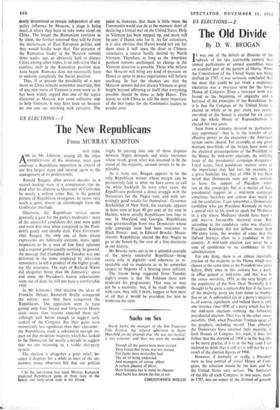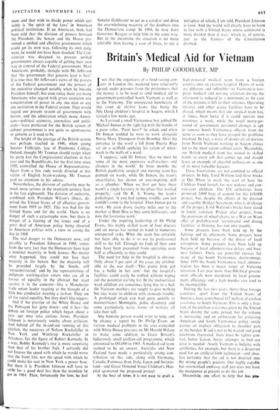The Old Divide
US ELECTIONS-2
By D. W. BROGAN
Seen from a country devoted to 'parliamen- tary supremacy'—that is, to the transfer of all effective power to the executive—the American system seems absurd. For example, at any given moment two-thirds of the Senate have none of the electoral preoccupations of the President or the House. In 'mid-term' elections, the unifying force of the presidential campaign disappears. Local issues, local candidates recover some of the importance they had lost, for example, in a great landslide like that of 1964. It has been noted that Democrats were not very anxious to have the support of President John- son in this campaign; but as a matter of fact, presidential support in a mid-term campaign sometimes backfires and seldom does much to aid the candidates. I can remember a Democratic candidate who got President Kennedy to make a special visit to his town to speak for Medicare in a city where Medicare should have been— and was—a favourable electoral issue. But, according to the candidate (who was elected), President Kennedy did not deliver more than 500 extra votes, the number of votes that the Oxford Surveys allow to a candidate in this country. A Mid-term election can never be a vote of confidence or no confidence in the administration.
For one thing, there is an almost inevitable erosion of the majority in the House which was chosen at the same time as the President two years before. Only once in this century has a party in office gained at mid-term, and that was in the annus mirabilis, 1934, at the very height of the popularity of the New Deal. Normally it is thought to be quite a remarkable feat if the losses of the majority party are kept dawn to twenty- five or so. A substantial cut in a party's majority is, of course, significant and indeed there is only one instance since 1890 of a party which has lost the mid-term elections winning the following presidential election. That was in the other annus mirabilis, 1948, when President Truman upset all the prophets, including myself. Thus although the Democrats have retained their majority in both Houses of Congress this week, it does not follow that the election of 1968 is in the bag. Or, to be more precise, if it is in the bag (and I am inclined to think that it still is), it will not be as a result of the election figures of 1966.
However, if formally or really, a President were to lose control of either House of Corn- gTess, the situation would be for him and for the United States very serious. The limitation of the life Of each Congress to two years. made in 1787, was an aspect Of the distrust of govern-
ment and that wish to divide power which cer- tainly is 'the spirit of the laws' in American political institutions. If an American, then, had been told that the division of powers between the President, the Senate and the House pre- vented a unified and effective government which could get its own way, following its own judg- ment, he would not have been shocked. The Con- stitution was designed to prevent unified governments always capable of getting their own way in control of the Federal government. Most Americans, probably, thought with Mr Jefferson that 'the government that governs least is best.' It is true that Mr Jefferson's views of the powers of the Federal government and the powers of the executive changed notably when he became President himself; but even today there are many Americans who regard with grave suspicion any concentration of power in any one man or any one institution in the Federal system. They would regard our present system of government with horror, and the admiration which many Ameri- cans—political scientists, journalists and politi- cians—have professed for the British system of cabinet government is not quite so spontaneous or genuine as it used to be.
The height of the prestige of the British system was perhaps reached in 1946, when young Senator Fulbright, late of Pembroke College, Oxford, thought Mr Truman should resign when his party lost the Congressional elections in that year and the Republicans, for the first time since 1928, controlled the House of Representatives. Apart from a few rude words directed at this victim of English brain-washing, Mr Truman paid no attention to his advice.
Nevertheless, the division of authority may be much more serious in the twentieth century than in the late eighteenth. The division of authority, combined with President Wilson's illness, de- prived the United States of all effective govern- ment from 1919 to 1921. This was bad for the United States and for the world. There is no danger of such a catastrophe now; but there is danger of a fuzzing of the issues and of a great deal of American policy being diverted to American politics with a view to saving the day in 1968.
The real danger to the Democrats now, and possibly to President Johnson in 1968, comes from the very fact that the Democrats have kept a nominal majority in both houses. No matter what happened, they could not lose their majority in the Senate. But the majority will be provided largely by the South, still 'unreconstructed,' and by the representatives of indignant working-class voters who are all in favour of equality in the abstract but react against it in the concrete—like a Manchester trade union leader reacting at the thought of a
Sikh bus conductor wearing a tug-ban. They are all for racial equality, but they don't like niggers. And if the prestige of the White House and the Pentagon has gone down—and it has—the debate on foreign policy which began about a
year ago may take curious forms. President Johnson is notoriously touchy about criticism. And behind all the in-and-out running of this election, the successes of Nelson Rockefeller in New York and Winthrop Rockefeller in Arkansas, lies the figure of Robert Kennedy. In a way, Bobby Kennedy's rise is more surprising than that of his brother Jack. I certainly did not foresee the speed with which he would move into the front line, nor the speed with which he could make his seat in New York a power base. But there it is. President Johnson will have to settle for a good deal less than the mandate he got in 1964. Then, fortunately for him, he had Senator Goldwater to act as a catalyst and drive the overwhelming majority of the doubters into the Democratic camp. In 1968, he may have Governor Reagan to help him in the same way. But in the meantime the situation is no more tolerable than having a case of hives, to use a metaphor of which, I am told, President Johnson is fond. And the world will clearly have to learn to live with a United States whose command is more divided than it was: which is, of course, just as the framers of the Constitution planned.







































 Previous page
Previous page